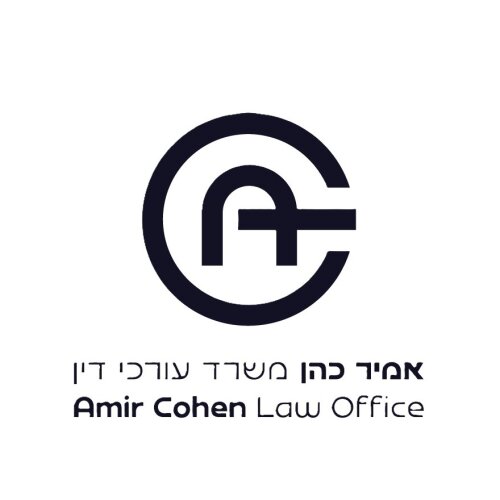Best Family Lawyers in Tel Aviv
Share your needs with us, get contacted by law firms.
Free. Takes 2 min.
Free Guide to Hiring a Family Lawyer
List of the best lawyers in Tel Aviv, Israel
About Family Law in Tel Aviv, Israel
Family law in Tel Aviv, Israel, encompasses a range of issues related to family dynamics, including marriage, divorce, child custody, inheritance, and more. The legal framework aims to resolve conflicts and provide justice while ensuring the best interests of family members, particularly children. Given Tel Aviv's diverse population, family law here often involves navigating multiple cultural and religious considerations.
Why You May Need a Lawyer
There are numerous situations where individuals may require legal assistance in family law:
- Divorce: Navigating the legal proceedings and ensuring fair division of assets.
- Child Custody: Determining legal and physical custody arrangements that serve the child's best interests.
- Adoption: Understanding the legal process and requirements for adopting a child.
- Domestic Violence: Seeking protection orders and legal recourse for victims.
- Marital Agreements: Drafting prenuptial or postnuptial agreements to protect individual assets.
- Estate Planning: Preparing wills and trusts to manage and distribute assets according to one's wishes.
- Paternity Issues: Establishing or disputing paternity for parental rights and responsibilities.
Local Laws Overview
The family law system in Israel is unique due to its combination of civil and religious laws. Here are some key aspects:
- Marriage and Divorce: These are predominantly governed by religious courts. For example, Jewish marriages and divorces fall under the jurisdiction of rabbinical courts.
- Child Custody: Israeli law prioritizes the child's best interest, often considering factors such as parental stability, child's age, and parent-child relationship.
- Alimony and Child Support: The financial responsibilities towards a spouse or children post-divorce are determined based on various factors, including income and living standard expectations.
- Domestic Violence: Israeli law provides protective measures, including restraining orders and police intervention, to safeguard victims of domestic violence.
- Inheritance: Both religious and civil laws may apply to inheritance disputes, and wills must comply with legal standards to be effective.
Frequently Asked Questions
What is the procedure for getting a divorce in Israel?
In Israel, the procedure for getting a divorce involves filing a petition in the appropriate religious court. For Jews, this is the Rabbinical Court. Mediation is often encouraged before court proceedings.
Can same-sex couples get married in Tel Aviv, Israel?
Same-sex marriages are not performed in Israel. However, same-sex marriages conducted abroad are recognized for certain purposes such as registration in the Population Registry.
What are the factors considered in child custody cases?
Child custody cases consider the child's best interests, including the child's age, each parent's caregiving ability, the parent's willingness to cooperate, and the child's preferences, depending on their age and maturity.
How is child support determined?
Child support is determined based on the child's needs and the non-custodial parent's income and financial capacity. The child's standard of living prior to divorce is also taken into account.
What legal protections are there for victims of domestic violence?
Victims of domestic violence can obtain protective orders, and police intervention is available. Shelters and support services also provide assistance and protection.
How can I contest a will in Tel Aviv, Israel?
To contest a will, you must file a claim in the Family Court or District Court, presenting evidence that the will does not meet legal standards or that it was created under duress, fraud, or undue influence.
What are the legal requirements for adopting a child?
Adoption procedures in Israel require approval from the Ministry of Welfare and Social Services. Prospective parents must undergo rigorous evaluations and meet specific legal criteria.
Do prenuptial agreements hold up in Israeli courts?
Yes, prenuptial agreements are legally binding in Israeli courts, provided they comply with legal standards and are properly executed and notarized.
How can I establish paternity?
Paternity can be established through a mutual agreement, or if disputed, through a court order mandating DNA testing to confirm biological parentage.
What is the role of mediation in family law disputes?
Mediation plays a significant role in resolving family disputes amicably. It involves a neutral third party helping the involved parties reach a mutually acceptable agreement, often encouraged before court litigation.
Additional Resources
Several resources are available to those seeking legal advice in family law:
- The Israeli Ministry of Justice: Offers information on family law and legal aid services.
- The Rabbinical Courts Administration: Provides details on Jewish marriage and divorce procedures.
- Family Courts: Handles civil matters relating to family law, including inheritance and custody disputes.
- Women's Rights Organizations: Such as Na'amat and WIZO, offer support and legal assistance for domestic violence victims.
- Child Welfare Services: Can provide guidance and support for child custody and welfare issues.
Next Steps
If you need legal assistance in family law, follow these steps:
- Consult a Lawyer: Seek advice from a qualified family law attorney to understand your rights and options.
- Gather Documentation: Assemble all relevant documents, such as marriage certificates, financial records, and communication logs, which may be pertinent to your case.
- Consider Mediation: Explore the possibility of mediation to resolve disputes amicably without court intervention.
- File Necessary Petitions: Work with your lawyer to file required legal petitions and motions in the appropriate court.
- Attend Hearings: Be prepared to attend court hearings and mediation sessions as scheduled.
By following these steps and utilizing available resources, you can effectively navigate the complexities of family law in Tel Aviv, Israel.
Lawzana helps you find the best lawyers and law firms in Tel Aviv through a curated and pre-screened list of qualified legal professionals. Our platform offers rankings and detailed profiles of attorneys and law firms, allowing you to compare based on practice areas, including Family, experience, and client feedback.
Each profile includes a description of the firm's areas of practice, client reviews, team members and partners, year of establishment, spoken languages, office locations, contact information, social media presence, and any published articles or resources. Most firms on our platform speak English and are experienced in both local and international legal matters.
Get a quote from top-rated law firms in Tel Aviv, Israel — quickly, securely, and without unnecessary hassle.
Disclaimer:
The information provided on this page is for general informational purposes only and does not constitute legal advice. While we strive to ensure the accuracy and relevance of the content, legal information may change over time, and interpretations of the law can vary. You should always consult with a qualified legal professional for advice specific to your situation.
We disclaim all liability for actions taken or not taken based on the content of this page. If you believe any information is incorrect or outdated, please contact us, and we will review and update it where appropriate.
Browse family law firms by service in Tel Aviv, Israel
Tel Aviv, Israel Attorneys in related practice areas.

















